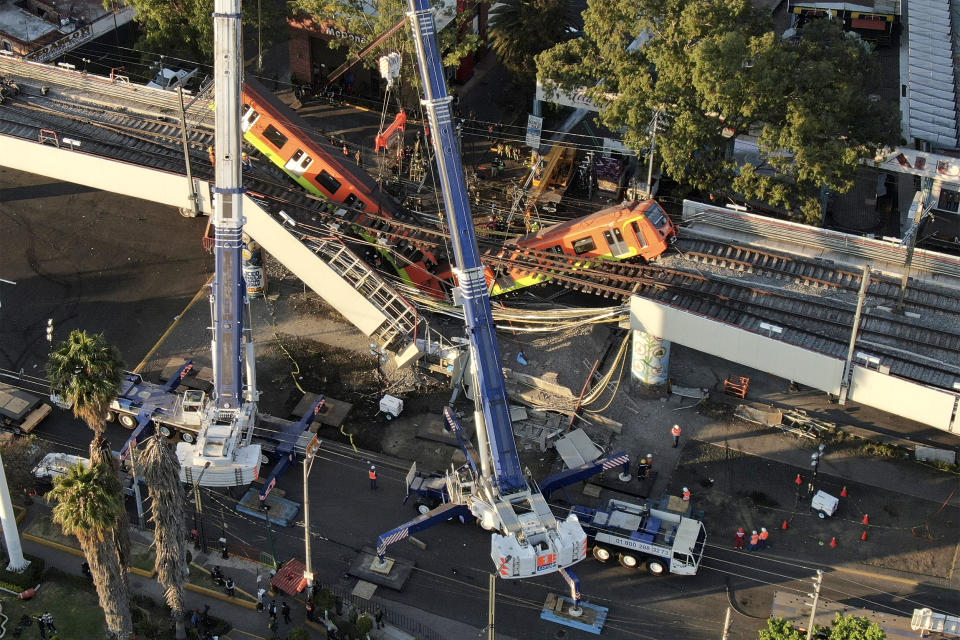Preliminary report blames construction errors for deadly Mexico City metro collapse
- Oops!Something went wrong.Please try again later.
A structural failure caused by at least six serious construction errors led to the collapse of a Mexico City metro train overpass last month that killed 26 people, according to a preliminary accident report the municipal government presented Wednesday.
The document, which the Norwegian company DNV and international experts prepared at the request of the Mexico City government, found multiple problems with the screws, beams and planks used in the structure.
It further detailed deficiencies in the welding of bolts that were not fused as they should have been to prevent erosion from water and use. It said bolts were missing in the beams that make up the bridge, that different types of concrete were used and that some welds were poorly made or not completed.
Mayor Claudia Sheinbaum said at the news conference that officials will continue to investigate and follow up "not only because of our legal obligation but because of our ethical, human and moral commitment."
The city's public works secretary, Jesús Antonio Esteva Medina, said reviewers visited the accident site to prepare the report, adding that laboratory tests are still needed to determine, for example, whether any incorrect or defective materials were used.
Esteva said they found deformed beams in the section where the metro track was curving and that other beams had slid from their positions.

Mexican Foreign Minister Marcelo Ebrard, who was Mexico City's mayor when the so-called Golden Line was built, defended his management of the project Wednesday and reiterated his willingness to work with the authorities.
"I support the carrying out of the necessary expert and technical investigations to determine the causes of the accident and define the responsibilities that may arise," Ebrard, one of the most important political figures in the national administration, said in a letter posted on Twitter.
Ebrard said decisions about the layout, design, construction and supervision of the metro line were made in consultation through committees and that there is ample documentation.
Wednesday's report found that a different concrete was used where the crucial Nelson bolts were placed — and that the bolts were not spaced equidistantly, "which does not comply with the design," Esteva said. The bolts also were not pushed well into the beams, and fewer bolts were used than required.
"In the area of the fault, the necessary reinforcements in the columns were not observed, and the foundation was shallow" in the columns, Esteva said.
The report said information about repairs carried out after the rail line was built and about the daily maintenance tasks at that section of the subway still need to be analyzed.
DNV maintained that its objective, beyond clarifying the cause of the incident, is to determine whether there are systemic problems to prevent them in other sections of the metro.
An elevated bridge of Line 12 collapsed between the Olivos and Tezonco stations shortly before 10:20 p.m. local time on May 3, causing one of the country's biggest rail-related tragedies.
In addition to the 26 people who died, almost 100 more were injured. The head of the capital's government, Claudia Sheinbaum, promised a thorough investigation.
"Noticias Telemundo Investiga" gained access to a report the city's congress issued in May 2019 to the management of the metro addressing service delays and its administrative and financial status. The document describes the use of defective parts to repair trains and reports that unskilled employees, such as ticket officers, were performing maintenance work.
Mexico City's metro, which transports about 6 million people every working day, is one of the busiest such systems in the world. Several citizen groups have criticized the precariousness of the facilities and a lack of maintenance that causes frequent interruptions in service.
A second phase of the report will be delivered July 14, and Phase 3 will be delivered Aug. 30.
A version of this story was first published on Noticias Telemundo.
Follow NBC Latino on Facebook, Twitter and Instagram.

